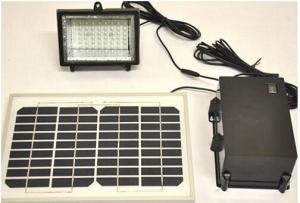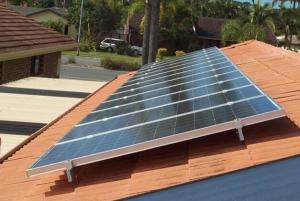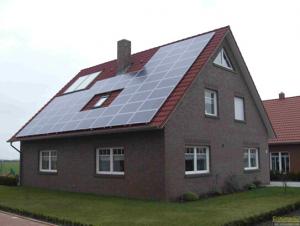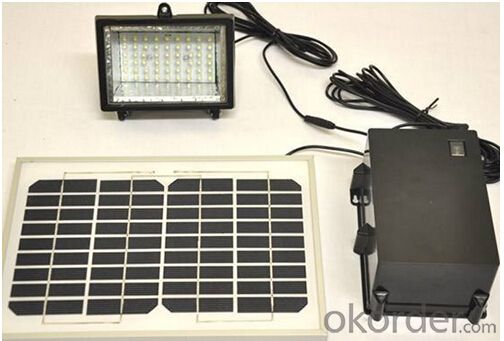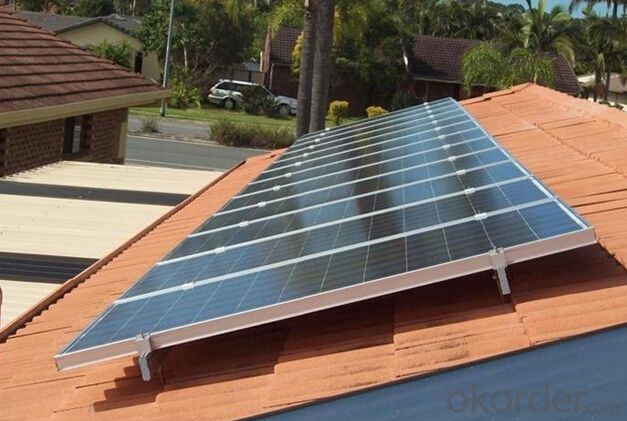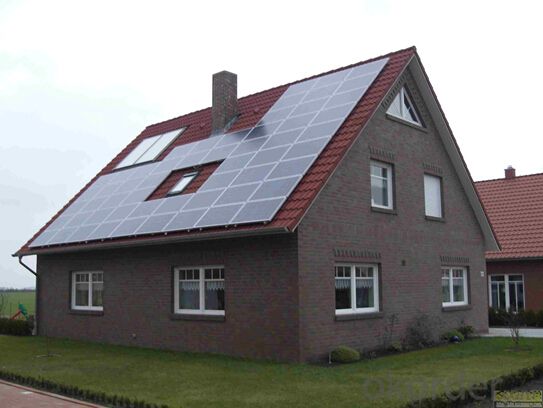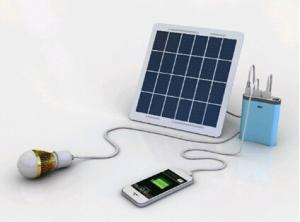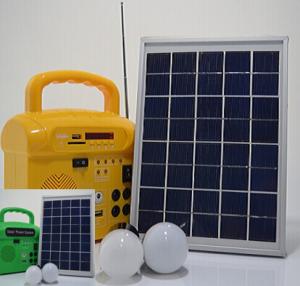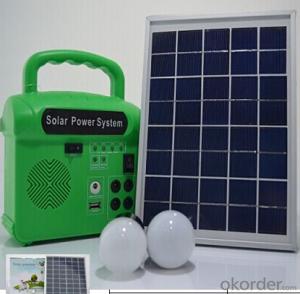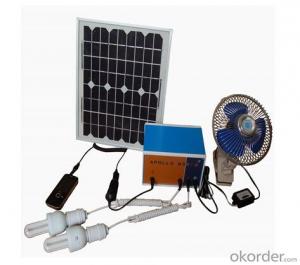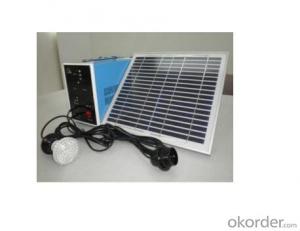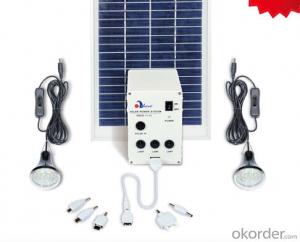CNBM Solar Home System Roof System Capacity-60W
- Loading Port:
- China Main Port
- Payment Terms:
- TT or LC
- Min Order Qty:
- 100 pc
- Supply Capability:
- 10000 pc/month
OKorder Service Pledge
OKorder Financial Service
You Might Also Like
Introduction of our company
We are the first solar racking system developer in China, who committed to solar racking system R&D, producing and marketing for about 10 years. We were the OEM for Sunpower, and are one of the largest rooftop solar racking system supplier in Japan and Australia now.
We are persisting the path of specialization, scale and internationalization development. We have been imported the international advanced technology equipment for manufacturing , assembling and testing. Frontier solar racking system is with own patents. The dynamic wind resistance reliability of our racking system can up to 270km/h. Therefore, superior product quality with more than 25 years' durability and perfect after-sale service have earned us a high reputation in PV industry worldwide.
Working Principle of Solar Roof System
The stand alone Solar Home System is an off-grid solar system which uses batteries to store the solar energy. Stand alone solar system solutions design for those who are not able or willing to connect to electricity grid.
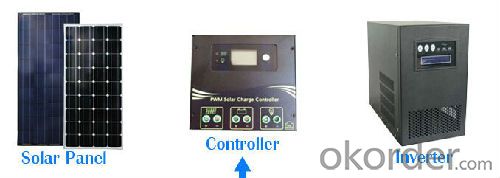
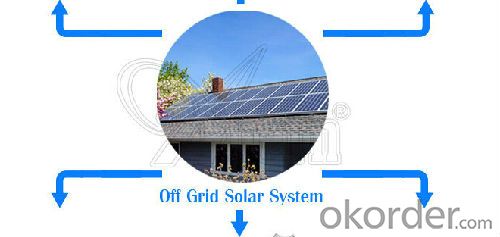

Specification of Solar Home System
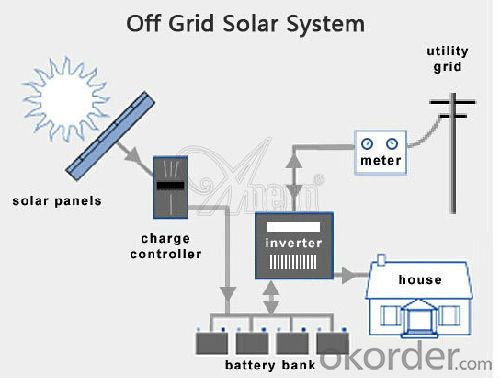
Product Features of Solar Home System
1. AVR Functions:AC145V-275V(input),AC198V-242V (output)
2. 400W continuous, standard and stable pure sine wave
3. Adopts CPU control technique
4. Integrated with inverter, solar controller inside.
5. PV priority mode or AC priority model is identified and swithched automatically
6. Choose the charging current based on the configured capacity of the battery
7. LCD display
8. Wide input range
9. Auto city power switch function, All-around protection, self-recovery and unattended operation.
10. Frequency auto adaptive
11. The system will act as UPS(charge from Grid electricity and automatic supply power when Grid cut off
12. Unattended and intelligent monitoring RS232 (optional)
13. Solar engergy and utility power complementary functions:
*The system can provide electricity produced by solar energy to loads directly.It can auotmatically select the solar energy or utility power as power source according to the change of sunshine, and the work mode will be chosen and switched automatically.
*The systems can automatically select the solar energy or utility power to charge the battery according to the state of the sunlight and battery voltage. AC by pass without charging function is available.
*The systems can automatically identify the state of day and night, and interactive switches between AC mode and inverting mode at night.
Advantage of Our Solar Home System
1. solar power system operation can automatically control and manual control modes.
2. Easy installation, energy saving (saving coal and petroleum resources, reduce pollution / noise emissions); do not need to lay long-distance transmission lines, do not build large substation, system stability, less maintenance, low maintenance cost, daily / each month / year electricity clearly visible, and can be entered into the computer record.
This solar system configuration is for reference. It can be adjusted based on actual condition and requirement. All parts have been tested and proven in actual operation with enough reliability and stability. It’s suggested to source whole system as a pack from us to guarantee the system compatibility.
Terms and Conditions
1. Trade terms: FOB Shanghai
2. Payment terms: 30% T/T, balanced before shipment/ LC at sight before shipment. Actual Terms can be negotiated for big order.
3. Package: Exported standard package suitable for tough handling and sea transport.
4. Delivery: Goods to be ready within 10~30 days depending on order quantity.
5. Warranty: 10 years for solar panel, 2 years for controller/inverter/battery.
FAQ
Q1. Can we design packaging?
Yes, but there is with quantity limitation. For 10,000 pcs, we will make the packing free for the client, and if less than 10,000 pcs, we can talk, the package is free or little money will be charged.
Q2. Can we add our logo on products?
Yes, there are several ways to do this. We can put the label of your logo on the products or make the silk print of your logo on the products. It is free.
Q3. can we customize product?
OEM and ODM are welcomed from Anern. We have rich experiences in this area.
Q4. What is your company return policy?
If we Anern breaks the contract of any agreement on price, quality and any other terms and conditions on the contract, the buyer can return the goods back to us and we will send the money back to buyers. Force majeure and god act are excepted.
Q5. What is your main product line is made?
LED street light and solar street lighting system, LED high bay light, LED flood light, LED tube light, bulb light, panel light, ceiling and down lights, all kinds of indoor lighting and outdoor lighting are available.
Q6.If I have a question I would like advice on how to contact you?
The best way is by e-mail. Tel, wechat, whatsapp, skype, contact us on our website online service worker are good ways to reach us also.
Q7. What will you provide services?
Solution providing, engineering, system design, best products suggestion, quality control, delivery, after sale service and many others. You can get our feedback during 24 hours.
- Q: Can solar energy systems be used for desalination?
- Yes, solar energy systems can be used for desalination. Solar-powered desalination systems use solar energy to power the desalination process, typically through solar thermal or solar photovoltaic technologies. This renewable energy source offers a sustainable and environmentally friendly solution for producing freshwater from seawater, making it a viable option for areas with limited access to clean water.
- Q: Can solar energy be used during power outages?
- Yes, solar energy can be used during power outages. Solar panels generate electricity from sunlight, which can be stored in batteries for later use. This stored energy can then be used to power essential appliances and devices during power outages, providing a reliable source of electricity even when the grid is down.
- Q: How do solar energy systems impact energy resilience during natural disasters?
- Solar energy systems can greatly enhance energy resilience during natural disasters. Unlike traditional power grids that rely on fossil fuels, solar energy systems generate electricity from sunlight, making them more reliable and less vulnerable to disruptions caused by extreme weather events. During power outages, solar panels can continue to produce electricity, providing a reliable source of energy for critical infrastructure, emergency services, and households. Additionally, solar energy systems can be combined with energy storage solutions such as batteries, allowing excess energy to be stored and used when the sun is not shining, further increasing energy resilience. Overall, solar energy systems play a crucial role in ensuring a more resilient and sustainable energy infrastructure during natural disasters.
- Q: What is the impact of fire on solar panels?
- The impact of fire on solar panels can be significant and detrimental. Fires can cause direct physical damage to the panels, such as melting or warping of the components. The extreme heat generated by a fire can also lead to the destruction of the electrical connections and wiring within the panels. Additionally, smoke and soot from the fire can deposit on the surface of the panels, reducing their efficiency and potentially blocking sunlight absorption. In summary, fires can render solar panels inoperable and require extensive repairs or replacements.
- Q: Can solar energy systems be used in powering scientific research vessels or marine laboratories?
- Yes, solar energy systems can definitely be used to power scientific research vessels or marine laboratories. Solar energy is a renewable and sustainable source of power that can be harnessed using photovoltaic panels or solar thermal collectors. Research vessels and marine laboratories require a significant amount of energy to carry out their operations, which often includes scientific experiments, data collection, and analysis. These activities typically involve equipment such as computers, sensors, and lab instruments that require a constant and reliable source of power. Solar energy systems can be installed on these vessels or laboratories to provide a clean and efficient source of electricity. The photovoltaic panels convert sunlight into electricity, which can then be used to power the various equipment and systems onboard. Additionally, excess energy produced by the solar panels can be stored in batteries for use during periods of low sunlight or at night. Utilizing solar energy in these marine environments offers several advantages. First, it reduces the dependence on fossil fuels and minimizes the carbon footprint associated with traditional power generation methods. This is especially important in the context of scientific research, as it aligns with the principles of environmental sustainability and conservation. Second, solar energy systems provide a reliable and independent source of power. Research vessels and marine laboratories often operate in remote or isolated locations where access to traditional power grids may be limited or non-existent. By utilizing solar energy, these vessels and facilities can generate their own electricity and continue their research activities without relying on external power sources. Finally, solar energy systems are low-maintenance and have a long lifespan. Once installed, they require minimal upkeep and can withstand the harsh marine environment. This makes them well-suited for use in research vessels or marine laboratories, where downtime and maintenance issues can be disruptive to ongoing scientific projects. In conclusion, solar energy systems can certainly be used to power scientific research vessels or marine laboratories. They offer a sustainable, reliable, and independent source of electricity, reducing the carbon footprint and ensuring uninterrupted research activities even in remote locations.
- Q: Can solar energy systems be used in areas with high population density?
- Yes, solar energy systems can be used in areas with high population density. In fact, they can be particularly beneficial in densely populated areas where the demand for electricity is high. Solar panels can be installed on rooftops, buildings, and even in urban spaces like parks and parking lots, allowing for efficient use of available space. Additionally, advancements in solar technology and the use of solar farms can further accommodate the energy needs of densely populated areas.
- Q: Can solar energy systems be used in powering movie theaters or entertainment venues?
- Certainly, movie theaters and entertainment venues can absolutely utilize solar energy systems to provide power. The operation of these venues requires a substantial amount of electricity for their lighting, sound systems, projectors, and other equipment. Solar energy systems have the ability to generate clean and renewable electricity by harnessing the sun's power. By installing solar panels on the roofs or in the surrounding areas of these venues, they can generate a significant amount of electricity to fulfill their energy requirements. Not only can solar energy systems be designed to supply power for the basic infrastructure of movie theaters or entertainment venues, but they can also support additional energy-intensive features such as HVAC systems, concession stands, and even electric vehicle charging stations. By utilizing solar energy, these venues can greatly reduce their dependence on grid electricity, decrease operational expenses, and contribute to a more sustainable and environmentally friendly future. Besides the practical advantages, the installation of solar energy systems in movie theaters or entertainment venues can also serve as a demonstration of environmental responsibility and attract environmentally conscious audiences. Many individuals are becoming increasingly aware of the significance of renewable energy, and by showcasing their commitment to sustainability, these venues can enhance their brand image and appeal to a wider customer base. In conclusion, the utilization of solar energy systems to power movie theaters or entertainment venues is not only technically viable but also financially and environmentally beneficial. By harnessing the sun's power, these venues can diminish their carbon footprint, save on energy costs, and contribute to a greener future for the entertainment industry.
- Q: What happens to excess electricity generated by a solar energy system?
- Excess electricity generated by a solar energy system can be stored in batteries for later use when the system doesn't produce enough power, or it can be fed back into the grid through a process called net metering, where it is credited to the owner's account to offset future electricity consumption.
- Q: Can solar energy systems be used for powering disaster relief operations?
- Yes, solar energy systems can be used for powering disaster relief operations. Solar power provides a reliable and renewable source of energy, making it ideal for areas impacted by natural disasters where traditional power infrastructure may be damaged or unavailable. Solar energy systems can be quickly deployed, enabling immediate access to electricity for emergency services, communication devices, medical equipment, and temporary shelters. Additionally, solar power systems reduce reliance on fossil fuels, minimizing environmental impact in already vulnerable areas.
- Q: How does the color of solar panels affect energy production?
- The energy production of solar panels is not significantly affected by their color. The color of solar panels mainly depends on the materials used in their construction, such as silicon or thin film. These materials have different absorption properties, but they are designed to efficiently absorb sunlight and convert it into electricity regardless of the color. However, it is important to note that darker-colored solar panels may absorb slightly more heat from the sun compared to lighter-colored ones. This can result in a slight reduction in overall efficiency as the panel's temperature increases. To address this issue, manufacturers often employ various cooling techniques, such as elevating the panels or incorporating cooling systems, to maintain optimum operating temperatures. In the end, the primary factor that influences energy production in solar panels is the amount and intensity of sunlight they receive, rather than their color. Factors such as the installation angle, geographical location, shading, and cleanliness of the panels have a much greater impact on their energy output.
Send your message to us
CNBM Solar Home System Roof System Capacity-60W
- Loading Port:
- China Main Port
- Payment Terms:
- TT or LC
- Min Order Qty:
- 100 pc
- Supply Capability:
- 10000 pc/month
OKorder Service Pledge
OKorder Financial Service
Similar products
Hot products
Hot Searches
Related keywords
